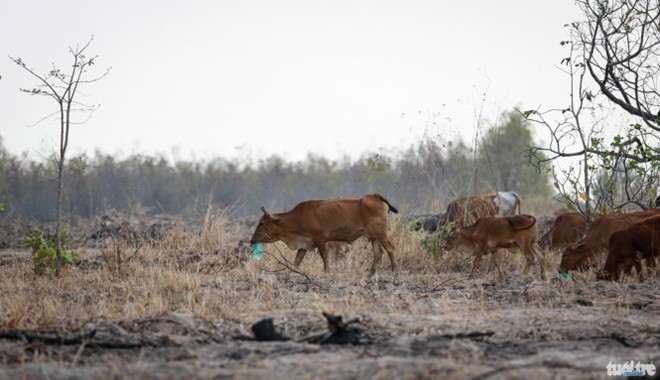 Society
Society

More than 130 cows and thousands of poultry died for drought in Ea Súp District in the Central Highlands province of Đắk Lắk, according to the latest statistics of the provincial Department of Agriculture and Rural Development.
 |
| More than 130 cows and thousands of chickens and ducks died from drought in Ea Súp District in the Central Highlands province of Đắk Lắk. – Photo tuoitre.vn |
ĐẮK LẮK – More than 130 cows and thousands of chickens and ducks died from drought in Ea Súp District in the Central Highlands province of Đắk Lắk, according to the latest statistics from the provincial Department of Agriculture and Rural Development.
The cows and birds died due to a shortage of drinking water and nutrition.
In Ia Lốp Commune alone, more than 80 cows died, whereas Ia Rvê Commune had more than 50 cow deaths.
Hundreds of hectares of crops were destroyed, and at least 91 wells ran dry.
Phùng Ngọc Cường, of Village 8 in Ia Rvê, said he had never seen such severe drought.
The commune did not have any grass, so Cường led his 40 cows anywhere they could find food, including garbage.
Cường had to buy a rickshaw to carry straw at a cost of VNĐ4 million (US$170) and drill a well, which cost more than VNĐ15 million ($660), to supply food and drinking water to his cows.
Phạm Bạo, also of Ia Rvê, said he mixed rice husk with saltwater to feed his cows. Several weaker ones were given restorative medicines and vitamin C.
“My cows are worth more than VNĐ1 billion ($44,400), but now no one wants to re-buy them, so I tried every way to cure them,” he said.
At present, more than 30 of Bạo’s 120 cows have died, resulting in losses of VNĐ300 million ($13,300).
Nguyễn Ngọc Phú, head of the Ea Súp District Department of Agriculture and Rural Development, said the cows died en masse because they lacked nutrition, food and drinking water. They ate so much cassava, so they got indigestion and then died.
Many cows in Ia Rvê and Ia Lốp communes died because the communes did not have irrigational systems or reservoirs.
The district said it would use spare funds to help local residents drill wells and help them provide food to the cows. The district reported conditions to the provincial authorities to ask for guidance and support, he said. -- VNS




